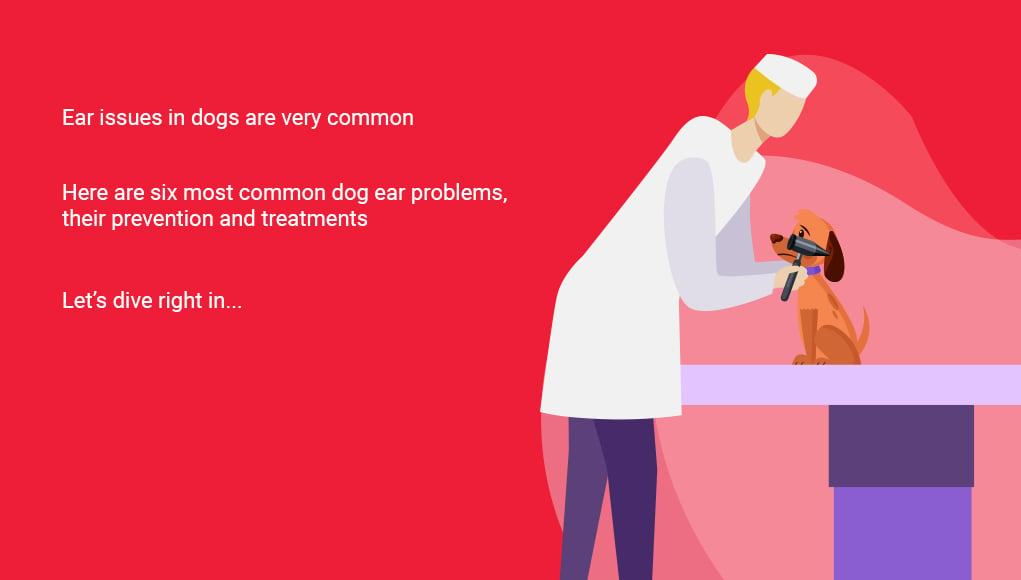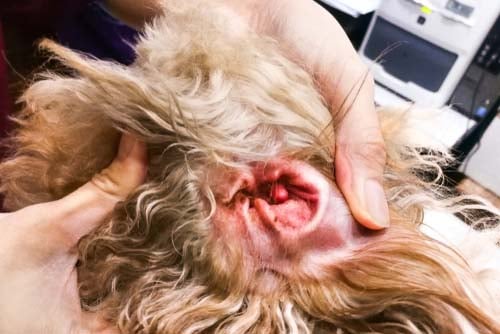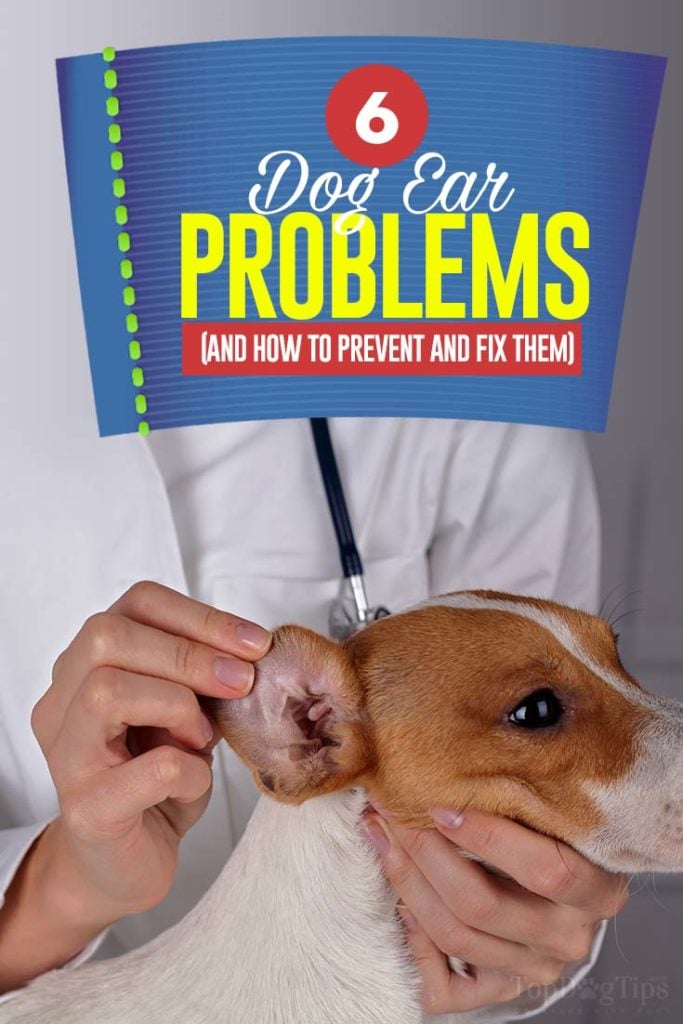Table of Contents
Ear issues in dogs are prevalent, and statistics show that one in five dogs will suffer from some ear disease throughout their life.
In most dog ear problems, these issues are mild and can be treated with simple home remedies and proper hygiene.
However, occasionally, a dog may develop an ear condition that requires professional vet care that's more immediate and expensive.
Due to their structure, dog ears are prone to many issues, and they must be cared for correctly regularly.
Below are the six most common dog ear problems with pictures and how to prevent and fix them.
1. Dog Ear Infections
One of the most often encountered dog ear problems is ear infections, and it's usually a repeating problem, especially if your dog spends a lot of time in the water.
Dogs with long and hanging ears like Bloodhound or Basset Hound are more likely to be affected by ear infections.
Your pup can get bacterial and yeast infections, both of which are usually accompanied by strong odors.
Other symptoms include redness, swelling, discharge, scabs, itchiness, head shaking, scratching, crusting, lack of balance, or scabs.
Ear infections can also be caused by other problems, like parasites, plucking ears, debris, and some autoimmune disorders.
Other potential causes include allergies, moisture, foreign bodies, excessive cleaning, wax buildup, injuries in the ear canal, and endocrine disorders (like thyroid disease).
Bacterial Infections – Strains of staphylococcus are primarily responsible for bacterial ear infections in dogs.
However, they are different from the strains that affect humans, so your pup is not contagious to humans and will not pass it to you.
Yeast Infections – Yeast is always present in your dog's ears, but yeast dog ear infection is caused by the overgrowth of yeast and not the mere presence.
Dogs with floppy ears are more likely to suffer from yeast infections.
How to Prevent It:
Keep your dog's ears clean and dry.
Proper dog ear hygiene is the best prevention against dog ear problems associated with bacterial infections.
Clean your pet's ears using an ear cleaner at least once a month and check his ears regularly for any scabs, discharge, or strange odor.
How to Fix It:
Using shampoos with chlorhexidine or even ordinary bleach can help you kill the bacteria on the skin.
Once the infection has set, using a regular ear cleaner will not help, and it's usually recommended to use a type of ear infection treatment instead.
Thorough, professional cleaning of the dog's ear is often recommended, especially in cases where the infection affects the middle ear and not just the outer ear.
Different topical and oral medication is used both for bacterial and yeast infections.
For yeast infection, the vet will prescribe topical antifungal cream or ointment. In contrast, surgery can also be a necessary option in severe cases where the condition doesn't go away after six weeks or more.
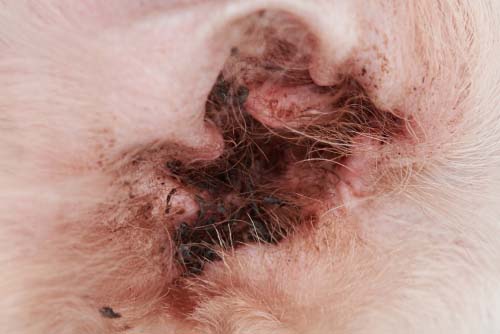
2. Allergies Cause of Dog Ear Problems
Allergies are a common cause of ear problems in dogs and dog ear infections.
The most common are food and airborne allergies.
The symptoms are the same as any other ear infection, which entails pain, redness, and discharge.
Dogs will often scratch their ears and shake their head if they have an ear infection due to allergies.
How to Prevent It:
Preventing dog ear problems due to allergies before they are diagnosed is practically impossible.
However, once you know what allergy caused the ear infection, you can avoid that allergen and protect your puppy from it.
If it's the environment, then avoid it altogether.
If it's some food, try an elimination diet to determine what causes the reaction.
How to Fix It:
Ear infections due to allergies are treated with ear cleaning and medications.
The first step is getting the proper veterinary diagnosis and identifying the allergen.
After that, dog ear infection medications will be prescribed and administered.
Antifungal drugs, antibiotics, and topical medication in ointments and drops are commonly used, but you must discuss this with a vet first.
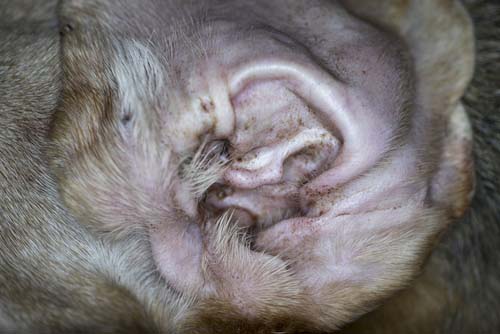
3. Dog Ear Mites
Although ear mites are a more common problem for cats, dogs can also have issues with these parasites.
There are a few different species of mites that can live in your dog's ear, and they are all very contagious, causing a variety of dog ear problems.
In most cases, ear mites are passed from a pet to pet through direct contact, so dogs that come in contact with cats are more likely to get them.
Inflammation of the ears, waxy secretion, odor, head shaking, and ear scratching are some of the symptoms of ear mites in dogs.
How to Prevent It:
Keeping ear mites away requires regular checkups and ear cleaning, preferably weekly at least once a month.
Proper hygiene of your house and your dog's living area is also essential.
If you have a cat in the house, be extra vigilant of ear mites passing onto the dog.
How to Fix It:
Cleaning your dog's ears thoroughly is the first step in treating ear mites.
After that, your vet will administer anti-parasitic medication either systematically or directly to your dog's ear.
In some cases, anti-inflammatory drugs or antibiotics might be necessary to treat ear issues in dogs and infections caused by ear mites.
There's also a natural way to do it in mild cases.

4. Hairy Ears Can Cause Dog Ear Problems
Breeds with very hairy ears can sometimes suffer from canine ear problems due to the number of hairs that grow in their ear canal.
Poodles, Lhasa Apso and Shih Tzu, are some of the known breeds to often have tons of hair in their ear canals.
Although this is a minor issue, it can sometimes lead to ear infections if the hair blocks the airflow and leads to moisture being trapped deep inside the ear canal.
How to Prevent It:
Regular grooming is the way to go. Don't let hair growth become a problem in the first place.
Take your dog to a groomer or grab a set of clippers and do it yourself.
Don't pluck your dog's ear hairs because that can create minor wounds which may get infected. Carefully trim the ears instead, and always keep them dry.
How to Fix It:
Once the issue occurs, consult with a vet and then use topical or oral medication to deal with the infection.
You'll need to clean up the hair in your dog's ears and keep them nicely trimmed in the future.
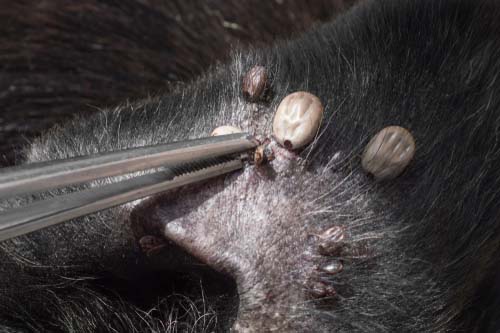
5. Debris, Foreign Objects, Ticks Causes Dog Ear Problems
Sometimes a dog's ear can be filled with debris, or some foreign object can get lodged in the ear canal, causing a variety of ear issues.
Ticks can also be the cause of dog ear issues.
Although these cases are sporadic when they occur, they are usually caused by a tiny object or something like plant debris.
How to Prevent It:
If your dog regularly plays in tall grass, you should check his ears for dirt or debris every time he comes back from it (you should be doing that for ticks already).
Even if he doesn't, regular checkups like once a week can help you spot the arising issue early and prevent future more severe ear problems in dogs.
How to Fix It:
The first simple fix is to investigate the ear and clean it up.
So if you suspect that your puppy has something stuck in his ear, take him to the vet or groomer or learn how to clean his ears yourself.
For more severe cases, you might need a complete veterinary checkup.
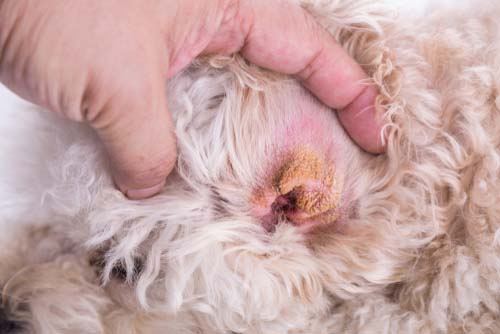
6. Dog Ear (Aural) Hematoma
Unlike the other typical dog ear problems and conditions mentioned above, that can cause ear infections, ear infections in dogs cause ear hematoma. Therefore it can be the result of one of the above ear-related issues.
Excessive shaking of the ears, scratching, and trauma can also lead to hematoma in dogs, which occurs when the blood vessels under the skin bleed until they form a fluid-filled pocket.
You can recognize dog ear hematoma if you see a swelling on your pup's ear flap, particularly on the tip of the ear.
How to Prevent It:
It isn't much you can do to prevent the hematoma besides taking your dog to the vet if you see him scratching his ear or shaking his head.
You can also decrease the chance of it occurring by preventing any of the above five dog ear issues through regular checkups, grooming, and cleaning.
How to Fix It:
This is a more severe condition, and the imperative is to address the underlying cause that leads to dog hematoma.
Treatment for the hematoma itself can include draining the fluid from it or removing it surgically.
Using a laser to reduce swelling is also a common practice.
Ear health problems in dogs are rarely a sign of some severe conditions.
In most cases, there's no reason to panic, and they are easily fixable, especially when they are spotted early on.
Take your dog to the vet if you notice anything unusual with his ears to get the best results, and to prevent it, ensure weekly ear checkups and grooming at home.
FAQs About Common Dog Ear Problems
The following FAQs give you the same information we covered above but in bite-sized pieces.
This can be helpful if you have a quick question and don't need in-depth information.
What could be wrong with my dog's ear?
Several things may be wrong with your dog's ear, including an ear infection, mites, or a foreign object in the ears.
How can I treat my dog's ear infection at home?
You should always consult your dog's vet if you suspect he has an ear infection.
This will ensure accurate diagnosis and get to the root of the problem.
It will also help prevent complications. Your vet will likely prescribe ear drops for your dog.
The vet may also suggest trying a mixture of water and vinegar in the meantime if you can't get an appointment right away.
Why is my dog shaking his head and scratching his ear?
When your dog is shaking his head and scratching his ear, he lets you know that something is wrong with his ear.
Something may be trapped inside, he may be itchy from allergies, an infection, or his hair may be in the way.
You should look at his ear and check for other symptoms.
How can I help my dog's ear problem?
The best solution to deal with your dog's ear problem is to take him to the vet.
The vet will likely suggest cleaning his ears and may also prescribe medicine.
What do vets give dogs for ear infections?
Vets typically give dogs antibiotics for ear infections.
These may be in pills, shots, or ear drops.


